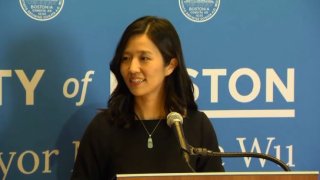
Boston Mayor Michelle Wu on Friday announced new design standards for certain city infrastructure projects that offer environmental benefits. The main focus of the designs will be something many people walk by without much thought - curb extensions.
The idea is to build new curb extensions, which improve pedestrian safety but traditionally create small, otherwise unusable paved spaces, with green infrastructure. This could range from something like rain gardens, which capture and store rainwater, to bioswales, which are sections of vegetation designed to control the flow of runoff, to tree pits or infiltration tree trenches, which create spaces to plant and grow trees. Other allowed designs include porous paving, subsurface infiltration areas, and one-time seeding to grow groundcover, low-grown fescue or wildflowers.
City officials say this type of infrastructure will improve stormwater mitigation, which should reduce chances of flooding, filter pollutants from the water and help with groundwater recharge. City officials say the green infrastructure can also have benefits like helping trees grow in urban environments and enhancing ecological diversity.
“Together these elements will improve community safety, foster community engagement, and boost our climate resilience," Wu said.
Get Boston local news, weather forecasts, lifestyle and entertainment stories to your inbox. Sign up for NBC Boston’s newsletters.
The green infrastructure designs should work alongside the city's existing network of nearly 36,000 catch basins and pipes, which are maintained by the Boston Water & Sewer Commission.
“Innovative green infrastructure policies offer an additional pathway to adapt to the impacts of climate change, such as stormwater flooding and sea level rise, while making our communities more resilient," said Rev. Mariama White-Hammond, Chief of Environment, Energy and Open Space.
For more information on these policies and the mayor's vision for safer streets, click here.

